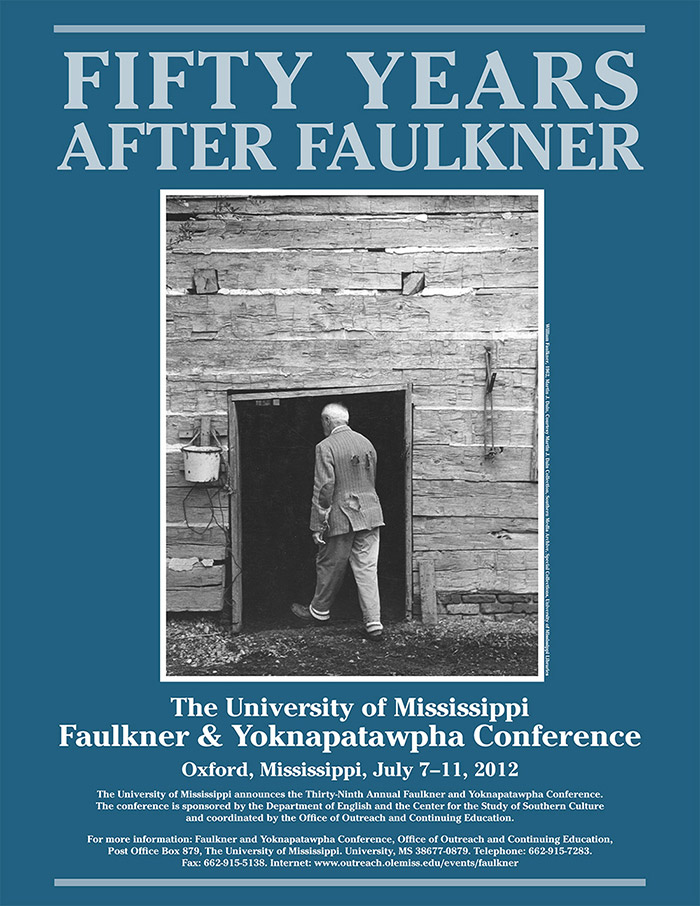
Panel. The Arc of Yoknapatawpha
Location
Nutt Auditorium
Start Date
11-7-2012 11:00 AM
Description
- Black Music, a Prelude to the Invention of Faulkner’s World: The Seminal/Pivotal Function of Place / Danièle Pitavy-Souques, Université de Bourgogne
“Black Music” will be examined as a founding text, where Faulkner becomes an American writer from the South. Here, for the first time, the text tells a story founded on dramatic events and set in a place of Faulkner’s own invention that represents the first draft of the fictional world that will become Yoknapatawpha. The use of newspaper clippings inspired by the collages of avant-garde painters like Braque causes a first territorial shift. The creation of wild sexualized backwoods that speak of the dream and the fury gives the story its intriguing role in the development of Faulkner’s literary career. The complex notion of the Two Arcadias (Simon Schama, Landscape and Memory) will be used as a critical tool. - Song and Silence: Unproductive Mourning in Go Down, Moses / Erin Kay Penner, Cornell University
On this occasion it seems fitting to reconsider Faulkner’s investment in rewriting the language of mourning. In this paper I take up elegiac Faulkner in a somewhat unexpected place: with Rider of the story “Pantaloon in Black.” This year marks the seventieth anniversary of the publication of Go Down, Moses, in which the story appears. Through Rider, Faulkner fashions a new, deliberately un-productive figure of mourning that challenges the long shadow of Freud on our conception of grief and mourning. Taken as a whole, Go Down, Moses marks a radical departure from the aesthetic of black endurance that we remember from Faulkner’s characterization of Dilsey in The Sound and the Fury. - Sanitizing Ike: Historical Revisionism and White Supremacy in The Reivers / Gavan Lennon, University of Nottingham
Faulkner’s last narrator, Lucius Priest, has often been taken at his word. This paper repositions The Reivers within the larger Yoknapatawpha cycle by examining the irony of the novel’s narrative discourse by comparing it with sections from the rest of the cycle. It re-examines the reliability of Priest’s narration to excavate a conservative history-making project intended to influence a younger generation of white southerners. I focus particularly on the very different representations of Isaac McCaslin in The Reivers and Go Down, Moses to show how Faulkner provides a space for understanding the ironic dimensions of Priest’s narrative.
Relational Format
Conference proceeding
Recommended Citation
Pitavy-Souques, Danièle; Penner, Erin Kay; and Lennon, Gavan, "Panel. The Arc of Yoknapatawpha" (2012). Faulkner and Yoknapatawpha Conference. 65.
https://egrove.olemiss.edu/fy/2012/schedule/65
COinS
Jul 11th, 11:00 AM
Panel. The Arc of Yoknapatawpha
Nutt Auditorium
- Black Music, a Prelude to the Invention of Faulkner’s World: The Seminal/Pivotal Function of Place / Danièle Pitavy-Souques, Université de Bourgogne
“Black Music” will be examined as a founding text, where Faulkner becomes an American writer from the South. Here, for the first time, the text tells a story founded on dramatic events and set in a place of Faulkner’s own invention that represents the first draft of the fictional world that will become Yoknapatawpha. The use of newspaper clippings inspired by the collages of avant-garde painters like Braque causes a first territorial shift. The creation of wild sexualized backwoods that speak of the dream and the fury gives the story its intriguing role in the development of Faulkner’s literary career. The complex notion of the Two Arcadias (Simon Schama, Landscape and Memory) will be used as a critical tool. - Song and Silence: Unproductive Mourning in Go Down, Moses / Erin Kay Penner, Cornell University
On this occasion it seems fitting to reconsider Faulkner’s investment in rewriting the language of mourning. In this paper I take up elegiac Faulkner in a somewhat unexpected place: with Rider of the story “Pantaloon in Black.” This year marks the seventieth anniversary of the publication of Go Down, Moses, in which the story appears. Through Rider, Faulkner fashions a new, deliberately un-productive figure of mourning that challenges the long shadow of Freud on our conception of grief and mourning. Taken as a whole, Go Down, Moses marks a radical departure from the aesthetic of black endurance that we remember from Faulkner’s characterization of Dilsey in The Sound and the Fury. - Sanitizing Ike: Historical Revisionism and White Supremacy in The Reivers / Gavan Lennon, University of Nottingham
Faulkner’s last narrator, Lucius Priest, has often been taken at his word. This paper repositions The Reivers within the larger Yoknapatawpha cycle by examining the irony of the novel’s narrative discourse by comparing it with sections from the rest of the cycle. It re-examines the reliability of Priest’s narration to excavate a conservative history-making project intended to influence a younger generation of white southerners. I focus particularly on the very different representations of Isaac McCaslin in The Reivers and Go Down, Moses to show how Faulkner provides a space for understanding the ironic dimensions of Priest’s narrative.

